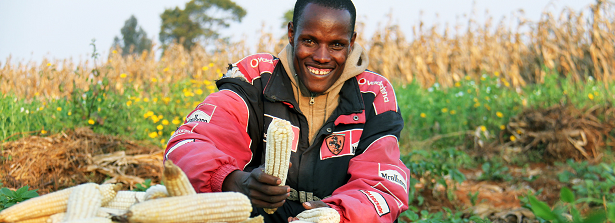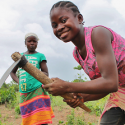Embassy workshop: Passionate youth for agricultural development

Combatting youth unemployment in developing countries has become a priority issue of policy agendas. In the context of increased global food insecurity, emphasis has been put on engaging youth in agricultural development. Yet challenges lie ahead as currently agriculture does not seem a very interesting business proposition for young people. Many also lack the skills to be a successful farmer. Gearing investments towards a small group of motivated and entrepreneurial youth might be the best and most cost-effective approach to address the employment and food security challenges, according to professionals that attended the food security exchange week workshop on youth.
Are the youth in developing countries indeed the farmers of the future? This was one of the questions raised at the workshop “Youth in agriculture” organized by the thematic direction “Inclusive Green Growth” from the Dutch Ministry of Foreign Affairs and moderated by Cees van Rij from Agriterra. The workshop was part of a five-day food security exchange visit for Dutch Embassies’ policy staff. In this workshop, representatives from the Dutch Embassies in Africa and Asia, the Dutch Ministry of Foreign Affairs, knowledge institutes and NGOs discussed effective approaches for youth empowerment in agribusiness. Raised issues included whether engagement of youth in agriculture is indeed key to inclusive development and if so, whether the youth should be treated as a separate policy focus or whether the issue should be mainstreamed throughout agricultural policies.
Not everyone can or should be a farmer
Engaging youth in agriculture can provide a solution for many future challenges related to food security, unemployment, urbanization and climate change. However, young people in developing countries face barriers as many lack access to knowledge, land, financial services and markets. They are also insufficiently involved in the policy dialogue about their own futures. As a result, in Africa just as the rest of the world, most young people see agriculture as a last resort instead of having a passion for it, says Dutch dairy farmer Nils den Besten. Den Besten is part of the Members’ Council of Friesland Campina and partner of KnowWhy.nl, a consultancy organization that provides knowledge to drive progress in agricultural development. As part of his work for example, he visited Kenya with the aim to assist small-scale dairy farmers to manage their farms more efficiently. Contrary to the current policy focus, he stressed that what many see as a problem – namely that young people are not interested in farming – could be as well a part of the solution.
“We need the people who are willing and who have the entrepreneurial skills”, Den Besten stated. He stressed that migration from the rural to the urban areas does not necessarily have to be a problem. For the agricultural sector in developing countries to become prosperous, it is necessary that cities provide sufficient productive jobs in the processing, manufacturing or services sectors, so that an urban middle class is created that will buy local agricultural products in the supermarkets. If only those with entrepreneurial skills and passion for farming stay behind in the rural areas, productivity and quality would increase. In this, Den Besten shared his own experience in the Netherlands where he was only able to scale up his farming when other people left farming. Hence boosting agricultural productivity requires a structural transformation of multiple sectors, rather than only the agricultural sector.
The Netherlands can play an advisory role
Certainly not all youth need to become farmers of the future. It is about targeting those who are willing and able to become a farmer. And providing those farmers the opportunities to develop the right skills via education (starting early) & vocational training. Participants in the workshop stressed that the Netherlands can play a key role in sharing its technical know-how with the youth, as well as by providing legal and administrative advice to them. In particular, the importance of role models was stressed. As Josephat Byaruhanga, a representative from the Dutch Embassy of Uganda, stated it: “We miss role models to inspire the youth. Dutch businesses like Rabobank and KLM can provide for such models by showing them how develop a competitive business strategy and how to make profits.”
Targeted policies or mainstreaming youth in policy programmes?
Currently, policy agendas are not yet geared sufficiently towards youth. The question was raised whether there should be youth specific programmes, or whether the issue of youth employment should be mainstreamed throughout agricultural policies? A significant part of the participants feared that when the youth is not specifically targeted, they will be forgotten. “Ticking the box is not enough” was argued by Chris de Nie, Senior Advisor capacity building at the Dutch Ministry of Foreign Affairs.
Others stressed that for policies to be effective, a comprehensive approach is necessary in which the youth are targeted within all key aspects of agricultural policy. The life cycle approach to nutrition security that the Dutch Embassy in Rwanda has started together with UNICEF provides a clear example of such a comprehensive approach. The aim of this multifaceted programme is to reduce malnutrition of children while simultaneously trying to stimulate their entrepreneurial ambition. The programme exposes these children to businesses from an early age and selects those with the most motivation and potential.
Again others like Melle Leenstra, representative of the Dutch Embassy in Kenya, stressed that it is not an either/or question. Rather some challenges require policies targeted specifically at the youth, while other challenges require that the youth-lens is integrated throughout other related policy areas as well.
Youth involvement in decision-making
Technical know-how and role models might not be enough to generate the needed passionate group of young people however. As participants stressed, in order for youth to be engaged in agriculture they need to be capitalized upon and empowered, and above all they need to be involved in policy-making. As Annette van Andel from AgriProFocus stressed, “[It is] key that we talk with the youth, rather than about them” and to make sure that they become the drivers of their own development. Engaging youth in agriculture is not a donor-driven exercise, but rather one that is supported locally and embedded in local development processes.
Passionate youth for agriculture
Overall, it became clear that there is a clear scope for more focused attention on entrepreneurial and passionate young people as farmers of the future. Nevertheless, many questions remained unanswered on how to identify those that have the skills and passion to be a farmer and how to make them drivers of their own development. As Melle Leenstra concludes, “There is a lot to learn from the experiences in the Netherlands to see farming as a business. It is important to engage with medium-sized farmers, those who are doing well in the cooperatives. And those who demonstrate willingness to make farming a success.” Furthermore, increasing productivity and employment in agriculture requires that young people have access to land and credit, as well as to local, national and international markets. At the same time, policy focus and investment should likewise be geared towards other economic sectors like manufacturing and services, so that these provide sufficient productive jobs for those people that do not have the skills nor passion to become a farmer.
The complete report of the Food Security Exchange Week will follow soon!
______________
Addressing certain thematic knowledge questions could be addressed to one of the Knowledge Platforms initiated by the Dutch Ministry of Foreign Affairs:
The Food and Business Knowledge Platform (F&BKP)
Recently, there has been a growing interest in engaging youth in agriculture. The F&BKP Office has mapped different actors working in this field. Some of these individuals working in the Netherlands have announced an interest in exploring a Knowledge Community of Practice in this field. The Food & Business Knowledge Platform will facilitate a first meeting and discussion with interested parties on Thursday May 12, 2016. If you are interested in attending this meeting, please contact us at info@knowledge4food.net
INCLUDE Knowledge Platform
Also, the INCLUDE knowledge platform puts emphasis on the potential role of agriculture in tackling the high numbers of youth unemployment in Africa. In its recent report on the future of agriculture in Africa’s transformation, INCLUDE outlined how comprehensive approaches are required to make Africa’s agricultural transformation successful in an inclusive manner. Moreover and together with F&BKP, INCLUDE will organize a side-event during the African Development Bank annual meeting which will address the role of agribusiness in creating jobs for youth and women.
Please follow the work of F&BKP and INCLUDE to stay updated about knowledge development on youth in agriculture.






